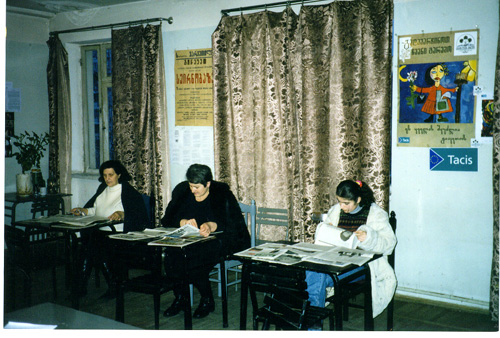 ECOLOGIA Board Member Paul Soler-Sala visited the Varketili library
project while in Georgia, seven months after it was funded. He did interviews, took photographs, and wrote this report for the Virtual Foundation:
ECOLOGIA Board Member Paul Soler-Sala visited the Varketili library
project while in Georgia, seven months after it was funded. He did interviews, took photographs, and wrote this report for the Virtual Foundation:
 ECOLOGIA Board Member Paul Soler-Sala visited the Varketili library
project while in Georgia, seven months after it was funded. He did interviews, took photographs, and wrote this report for the Virtual Foundation:
ECOLOGIA Board Member Paul Soler-Sala visited the Varketili library
project while in Georgia, seven months after it was funded. He did interviews, took photographs, and wrote this report for the Virtual Foundation:
I met with Gogi Zamukashvili, Director of Society Varketili, on the evening of March 16, 1999, at the Society Varketili offices which are located in a former regional nursery school in the Varketili district of Tbilisi. Society Varketili was created in 1995 to provide the citizens of the Varketili district of Tbilisi, Georgia, with a grassroots social support network, in lieu of the collapse of any discernible government support for even the most basic public health needs.
 In addition to the
specific projects carried out by the Society, Gogi indicated that the
motivational benefits generated from the positive examples of the
Society's successful projects to date coupled with the pride from numerous
volunteers from the community, have also been a noteworthy accomplishment
of the organization's efforts. Such efforts seem especially significant in
light of the dire conditions of the last ten years, including regional
secession, civil war, and economic disarray. The library/reading room is
only one of several Society Varketili projects housed in the nursery
school building. These projects function both independently and as part
of a larger, multi-faceted and organized community effort of the Society
Varketili.
In addition to the
specific projects carried out by the Society, Gogi indicated that the
motivational benefits generated from the positive examples of the
Society's successful projects to date coupled with the pride from numerous
volunteers from the community, have also been a noteworthy accomplishment
of the organization's efforts. Such efforts seem especially significant in
light of the dire conditions of the last ten years, including regional
secession, civil war, and economic disarray. The library/reading room is
only one of several Society Varketili projects housed in the nursery
school building. These projects function both independently and as part
of a larger, multi-faceted and organized community effort of the Society
Varketili.
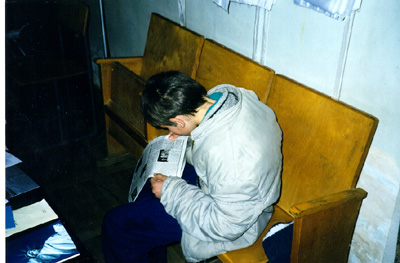
a) How has the library project helped the community?
Perhaps the most surprising finding of the interview was that the Virtual Foundation funding not only supported the community library, but it actually funded the entire purchase of all reading materials available to citizens, including annual subscriptions to 33 different popular newspapers, magazines and journals. Society Varketili provides the room and the tables and chairs as well as administrative support. Another discernible benefit is the creation of the only reading room in the region that not only provides the community with access to periodicals they would otherwise not be able to purchase (most of the more popular publications are currently too expensive to be purchased by individual citizens) but also furnishes the only public space for citizens to share ideas on current events and the ideas, including those set forth by numerous authors featured in the numerous available publications. It appears that nightly gatherings and ensuing discussions take place in the library with a cross-section of local citizens.
b) How do individuals in the community use the library?

According to Gogi and others present (including 2 children), there are approximately 40-50 regulars who frequent the library. Zia Poreshvili, an articulate high school teacher who makes approximately 50 Lari a month (25 USD), said that in addition to enhancing her political knowledge and understanding of the rising crime rates, she uses the publications as material for her high school students; something neither she nor the school could fund. She added that she often sends her students to the library to take advantage of the available publications.
Gocha Gagabadze, a local martial arts instructor and representative of an internationally-funded public health community effort, said that the reading room provides his only source of sporting and political news and outside perspectives. He added that the activities surrounding his youth martial arts groups are regularly covered in the local press.
c) What exactly has changed as a result of the Virtual Foundation grant?
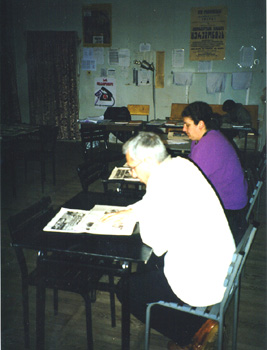
The grant has changed everything, as there was no library before the Virtual Foundation funding. The library is situated in a single reading room, where the publications are available to readers. Approximately a dozen desks are distributed throughout the room and reasonably spaced from one another. There is also a kerosene heater in the room, which proves to be especially helpful in the winter months (many families cannot even afford such single unit kerosene heaters). The walls of the reading room are decorated with a variety of materials describing Society Varketili's specific projects and awards, including a description of the Virtual Foundation and funding of the reading room.
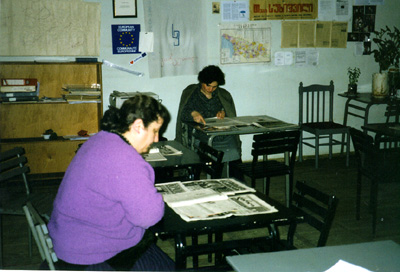
e) Has there been any communication with the donor?
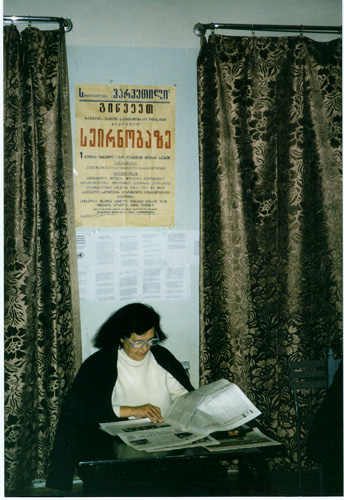
Personally, my strongest impression was from the amazingly personal reception I received from Gogi and his colleagues and the library users. It was almost as if he could hardly believe that I had come to simply learn how the Virtual Foundation grant had affected his community. I was impressed by the extent to which Society Varketili is a truly community-based NGO. On a more pragmatic note, I would like to emphasize Gogi's perseverance through extreme adversity. In the course of the organization's four year history, VC has received funding from numerous foreign entities, including SOROS, ISAR, the US, British and EU governments, among others. Although money has been a significant part of this support, Gogi emphasized that the alternative approaches and know-how conveyed by his fellow Georgians as well as foreign colleagues and supporters were equally - if not more - valuable.
Final Report from "Varketili"
On August 11, 1998, Horizonti, a Virtual Foundation Consortium Member, transferred the sum of $981.90 to the Society "Varketili" for the purpose of funding the "Ex Libris: New Hope for an Ancient Society" Virtual Foundation project. The library, which was open from 11 until 18 o'clock, spent the money donated through the Virtual Foundation to:
Many people, especially young people, came to the library. The patronage of the library increased the number of volunteers of Society "Varketili".
The library was open until 1 April. After finishing the project, the Society "Varketili" made plans to find some financial sources to continue the same activities. Society "Varketili" expresses gratitude to the Virtual Foundation and Horizonti for the financial support.